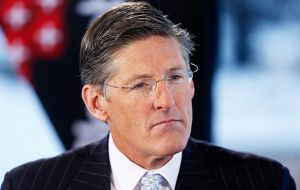MercoPress. South Atlantic News Agency
US Fed rejects Citigroup plans to boost dividends for shareholders
 “We are deeply disappointed by the Fed's decision,” Mr. Corbat said in a statement.
“We are deeply disappointed by the Fed's decision,” Mr. Corbat said in a statement. US Federal Reserve has rejected plans by Citigroup to buy back shares and boost dividends for shareholders. It cited deficiencies in the bank's ability to plan for how stressful situations would hurt its business. The decision is a setback for Citigroup boss Michael Corbat who was brought in to bolster internal controls after the bank failed stress tests two years ago.
Citigroup's shares fell more than 5% in after-hours trading in New York.
Citigroup had planned to buy back 6.4bn dollars in shares by the beginning of 2015, and increase dividends by 5%. It is the second time in three years that Citigroup's plans to return cash to shareholders have been rejected. The plan is seen as critical to Citigroup's profitability.
“We are deeply disappointed by the Fed's decision,” Mr. Corbat said in a statement.
Explaining the decision, Daniel Tarullo, a member of the Fed's board of governors, said: “With each year we have seen broad improvement in the industry's ability to assess its capital needs under stress.
”However, both the firms and supervisors have more work to do as we continue to raise expectations for the quality of risk management in the nation's largest banks.”
Capital plans of four other banks, including the US units of HSBC, RBS and Santander, were also rejected. Twenty-five other banks, including Bank of America, JP Morgan Chase and Goldman Sachs, were approved.




Top Comments
Disclaimer & comment rulesCommenting for this story is now closed.
If you have a Facebook account, become a fan and comment on our Facebook Page!